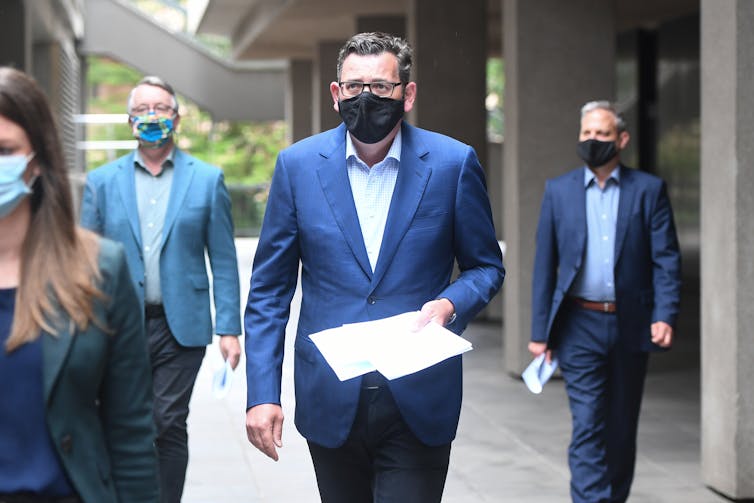A fairytale finish to 2020
- Written by Frank Bongiorno, Professor of History, ANU College of Arts and Social Sciences, Australian National University

Once upon a time, there was a happy land[1] that had no need of heroes. It had its problems, of course, but there were very few whose solution could not be put off until next year, next decade, or next century. The Great Warming was the most difficult, but the kingdom’s rulers did not worry over this very much, trusting the future to look after itself.
Life was sweet for most, and that produced a certain kind of ruler. He – and most of them were still men – was very good at creating the impression of frenzied activity while achieving very little. Many in government and parliament were graduates of student politics, and their aptitude for counting numbers and backstabbing rivals was highly valued in the Grand Palace on the Hill.
The rulers collected taxes and spent them according to formulas established long ago, while leaving over more than a little treasure to pass on to friends, patrons and favourites. They lived off the cleverness of the more able rulers of the past, those who governed in The Golden Age of the Eighties. Elections were now fought over whether shareholders should be given extra gold[2] by the government, and how many coins landlords should be given[3] to help them rent out cottages to poorer subjects.
The life even of rulers was cheap in the olden days, and kings and queens came and went with great regularity, the drama of it all keeping the people entertained when they became bored of Punch and Judy shows and maypole dancing. But this churn did not otherwise matter very much, as it affected only courtiers and politicians who hung around the bars near the Grand Palace on the Hill on Wednesday evenings.
Occasionally, a new monarch would come along and get excited about some unexpected happening, such as the sad time someone put some pins in the kingdom’s strawberries[4]. Or the parliament would face a wicked problem such as how much tax backpackers should pay[5] for the right to pick those strawberries. But generally, the rhythms of the court and the parliament were dull and predictable, and they engaged the attention of the common people very little.
“Go the Sharkies!”, said the king, and his affectionate subjects smiled knowingly. Many of them had dads, granddads, uncles, parrots and dolls with strings on their backs that you pull who said similar things.
 ‘Go the Sharkies!’ said the king. AAP/Craig Golding
‘Go the Sharkies!’ said the king. AAP/Craig Golding
Then along came the summer of 2019-2020. The king who said “go the Sharkies!” also said “I don’t hold a hose, mate[6]”. As his subjects choked on thick and poisonous smoke and saw their modest cottages razed to the ground, they began to wonder whether it was a good idea to have a superannuated town crier for their ruler. There was much talk at court of arsonists[7], who seemed remarkably like the people who put pins in strawberries. There were ideas about clearing bush and felling trees like the pioneers of old had done. There were also evil people called “Greens”[8] who, it was claimed, were at fault for the fires. The rulers and their scribes occasionally mentioned The Great Warming, but not if they could avoid it.
A few weeks later, The Great Pestilence came from the Rising Empire of the East. The king told the people they shouldn’t worry too much and should just be themselves, and he was off to the footy[9]. “Go the Sharkies!”, he said.
Read more: Australia's politicians have learned that in the era of coronavirus, the future comes at you fast[10]
In the Great City of the South, there was agonised debate about whether a big carriage race called The Grand Prix should be held[11], an occasion that each year brought together the people of many kingdoms in a grand festival. But people turned on their TVs and saw that in kingdoms far away, all was not well. They saw people dying. They saw infirmaries choked with patients, corpses on the streets.
It now occurred to the rulers that pins in strawberries and backpacker taxes were no longer worthy of their attention. It was time to put away childish things. For the first time in their lives, the king and his ministers were making decisions that would decide whether their subjects lived or died. They could not pretend that it was someone else’s job to hold the hose. In an amazing metamorphosis, some even began to look grown up.
New men and women emerged. The heroes before The Great Pestilence were sports stars and the winners of cooking programs. The new heroes were winsome professors of medicine.
The king got together with the dukes and duchesses around the kingdom to create what they called the National Cabinet. The National Cabinet was not a real government, but it gave the impression everyone agreed about everything, even when they didn’t.
 The king gathered with the dukes and duchesses from across the land, who in turn influenced him for good. AAP/Alex Ellinghausen
The king gathered with the dukes and duchesses from across the land, who in turn influenced him for good. AAP/Alex Ellinghausen
Some people in the kingdom found this reassuring, because they worried the king might again decide it was not his job to hold the hose and he would throw himself into home improvements[12].
But the dukes and duchesses influenced the king for good, moderating his worst instincts toward “keeping things open”. The king and his ministers also influenced the dukes and duchesses for good, moderating their cautious instinct toward “shutting things down”.
The king made a decision to stop people from entering the kingdom, unless they were his subjects returning from their crusades and adventures abroad. Such people were placed in solitary confinement for two weeks in four-star inns. The dukes and duchesses closed the borders of their territories, ordered their merchants to shut their doors, and told the people to stay home.
The streets of the kingdom were almost deserted, except for the lines of unemployed people[13] applying for help under the Poor Law and people buying take-away coffee. The benevolent king doubled the amount paid to the indigent, and he paid to support merchants, journeymen and labourers while they were unable to ply their trade.
This cost many billions in gold and the people were astonished, for they had been told for generations there was not enough money to support the indigent. Giving money to people for doing nothing only encouraged vagrants and vagabonds, it was often said. In any case, a mistake with a slide rule and abacus[14] meant the king did not have to spend as much treasure as he had expected.
Some worried that with so much money being thrown around, the more cunning among the nobles might be lining their pockets, for many subjects suspected there was corruption[15] in the kingdom. The people remembered how the king’s government had preyed on the poorest of his subjects with something called Robodebt[16], and they wondered why the politicians mouthed platitudes about “star chambers[17]” when anyone raised having a corruption commission.
In a crisis, a king may find he is dependent on his allies to keep order and defeat his enemies in the rural shires and distant towns. And so, when The Great Pestilence arrived, people were surprised at how much power could be exercised by the dukes and duchesses – even the minor ones – in their own lands.
At times, when the matter of border, school and business closures arose, it seemed the king had no power at all. It was the dukes and duchesses who held sway over the everyday lives of the king’s subjects. And these dukes and duchesses achieved great fame and popularity for keeping their people safe.
Read more: View from The Hill: Daniel Andrews frustrates Scott Morrison with a slow-pace lockdown exit[18]
When disaster struck in the great Great City of the South, and The Great Pestilence spread from the four-star inns to the common people, there was much condemnation of the grand duke in command of that city. After a brief time in which many of the rhythms of normal life had begun to return to the kingdom, and even the Sharkies were playing football again, schools, shops, inns and taverns again had to shut. The grand duke imposed a strict curfew on his people. An opposition faction, some scribes, and a few fanatics tried to foment revolt against the grand duke. They painted pictures of happy lands across the seas, such as Sweden, which did not have lockdowns and curfews. But the grand duke continued to rule, and the Great City of the South overcame the pestilence.
 The grand duke of The Great City of the South imposed a strict curfew on his people, and the pestilence was overcome. AAP/Erik Anderson
The grand duke of The Great City of the South imposed a strict curfew on his people, and the pestilence was overcome. AAP/Erik Anderson
As the year ended, glad tidings reached the kingdom from across the seas of powerful potions, as well as the overthrow of the Orange Friend of the Plague in the Grand Empire of the West. The people now realised that their kingdom, in spite of its ordeals, had endured The Great Pestilence better than most. Scholars in the universities discovered that for the first time in many years, the people trusted their governments again[19].
And the king was pleased. For his eye had already alighted on when he might call an election, to allow his subjects to express their love in the only way that truly mattered to him.
Read more: An obedient nation of larrikins: why Victorians are not revolting[20]
References
- ^ was a happy land (www.goodreads.com)
- ^ shareholders should be given extra gold (theconversation.com)
- ^ how many coins landlords should be given (theconversation.com)
- ^ pins in the kingdom’s strawberries (www.abc.net.au)
- ^ tax backpackers should pay (theconversation.com)
- ^ I don’t hold a hose, mate (www.abc.net.au)
- ^ talk at court of arsonists (www.abc.net.au)
- ^ evil people called “Greens” (www.abc.net.au)
- ^ he was off to the footy (au.news.yahoo.com)
- ^ Australia's politicians have learned that in the era of coronavirus, the future comes at you fast (theconversation.com)
- ^ The Grand Prix should be held (www.theguardian.com)
- ^ home improvements (www.youtube.com)
- ^ lines of unemployed people (www.theguardian.com)
- ^ a mistake with a slide rule and abacus (www.theguardian.com)
- ^ suspected there was corruption (www.abc.net.au)
- ^ Robodebt (theconversation.com)
- ^ star chambers (www.afr.com)
- ^ View from The Hill: Daniel Andrews frustrates Scott Morrison with a slow-pace lockdown exit (theconversation.com)
- ^ people trusted their governments again (www.theguardian.com)
- ^ An obedient nation of larrikins: why Victorians are not revolting (theconversation.com)
Read more https://theconversation.com/the-king-the-fires-and-the-fever-a-fairytale-finish-to-2020-149971













